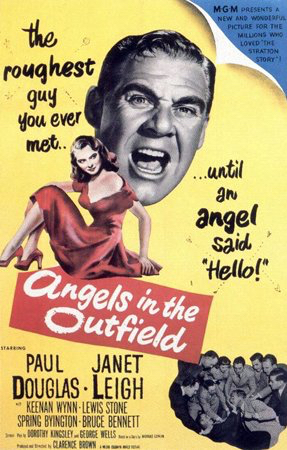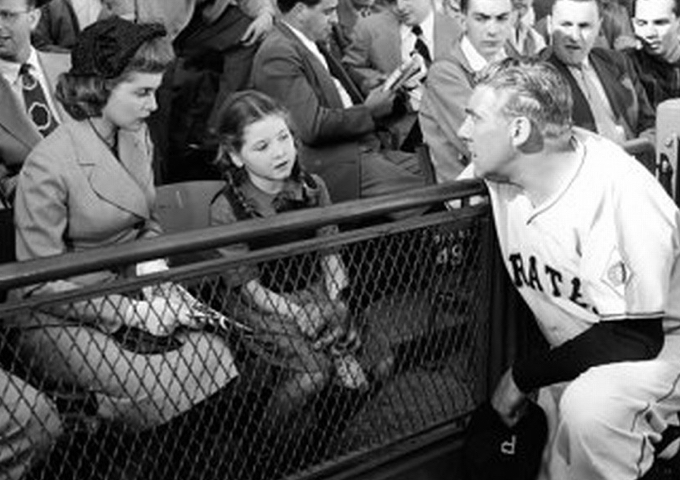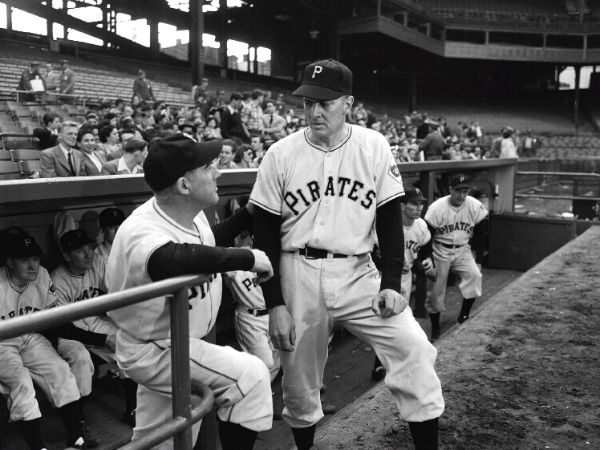Week of March 29 – April 4, 2020
Major League Baseball was supposed to have begun this week, and I for one will miss the National Pastime until it returns (probably in July, after the All-Star break). In the meantime, let’s look at a sentimental old movie that offers a fresh perspective to the game — and a lot of laughs, too.

This first version of Angels in the Outfield — it was remade by the Disney folks in 1994 — takes place in Pittsburgh (the Angels baseball team did not appear until 1961). Loudmouth Pirates manager “Guffy” McGovern (Paul Douglas) earns his nickname by giving everybody guff, especially the men on his own team. In an interesting trick of the time, his profane rants on the field (mainly against umpires) are rendered by playing tracks of Douglas speaking nonsense words edited over each other concurrently. It sounds like nasty stuff without actually saying much of anything! His pseudo-profanity gets McGovern into trouble, causing a female reporter watching her first baseball game to write a story encouraging his ouster — as well as a visit from an actual angel, who advises the manager to clean up his act, or else. The Pirates are a losing bunch, but they begin winning once the angel tells McGovern he will help the team win if the manager makes an effort.
When the angel tells McGovern he will help the team win, which is early in the story, I almost gave up on it right then and there. I suddenly remembered scenes from the 1994 movie, wherein angels lifted ballplayers to catch fly balls and helped them to run faster and throw pitches that could not be hit. Cheating, in other words. I’ve never liked the later Angels film because the angels help the team cheat to win. For the same reason, I’ve never really enjoyed the otherwise fun It Happens Every Spring from 1949; it is an ode to cheating. And don’t bother arguing the point with me; yes, it is cheating. However, even though the angel says he will help the team win, there is no cinematic evidence that he does so. The ballplayers begin to play better, but they don’t suddenly acquire superpowers or make plays that they would ordinarily not be able to make. As the story progresses, it seems that the team plays better because McGovern stops being such a bully and jerk. That works for me.
Once it becomes clear that the angel isn’t going to manipulate action just to fix things for the Pirates, I was able to relax and really enjoy the intricacies of the story. The way the Pirates players at first distrust McGovern’s new ways and attempts to control his temper, but then gradually warm up to him the way they should. The way Jennifer Paige tries to be fair to him, even when he does things that make her cringe. And, particularly, the notion that the angels exist and can be seen by one young girl, Bridget White (Donna Corcoran). Bridget had been praying for the Pirates, and it is intimated that her prayers began the whole saga, and only she can see the angels standing behind each of the players on the field. Thankfully, the film offers no special effects to support her claims; we either believe, or do not.

Not being a particularly religious soul, movies about angels and such normally don’t appeal to me, but anything can work if it is handled well, and Clarence Brown’s film handles the angel angle beautifully. First off, the angel voice is courtesy of James Whitmore, who makes matters clear early on that he isn’t going to take any guff from Guffy. Then, the reaction to seeing the angels and knowing they are present is perfectly acted by Donna Corcoran. Her belief is so pure that she cannot be doubted. This, of course, is contrasted by the public’s reaction, driven by the jaded sportswriters, which is a completely believable sense of disbelief and ridicule. Through it all, McGovern keeps his calm. “Dogs have fleas,” he tells Jennifer. “Managers have sports writers.”
The growing rapport between gruff McGovern and perky Jennifer is at the heart of the story, which embraces lovable Bridget when she joins in. The two females humanize the brusque manager, each in their own way, causing him to see things from perspectives other than his own. Along the way he becomes a better person — with a better vocabulary — and the team begins to win. That’s the message of the picture: it doesn’t take an angel’s presence or interference for things to get better; improvement will occur with small, manageable changes, if those changes are to the good. Maybe the situation needed the angel to announce himself to McGovern, but after the wake up call, things improve because the manager improves, and he gradually comes to appreciate the change he has made in himself. By the end of the story not only does his baseball team play better and win, but he has found himself a family that will be there for the rest of his life.
Sure, this is sentimental stuff, but it works. Baseball films lend themselves to sentimentality; watch The Natural or Field of Dreams or Bang the Drum Slowly or A League of Their Own or The Kid from Left Field or any number of others if you don’t believe me. There may be no crying in baseball according to Jimmy Dugan in A League of Their Own, but there’s plenty of crying in baseball movies. Try making it to the end of For Love of the Game or The Pride of the Yankees without tearing up. Can’t be done.

But not all in this film is playfulness and light. McGovern is a mean guy at the beginning, and he socks quite a few people, with good reason. One of them is sportswriter Fred Bayles (Keenan Wynn), with whom he has a running feud. Bayles hates the manager and will do anything to run him out of Pittsburgh, including cross-examining young Bridget White at a hearing designed to determine if the manager is mentally stable enough to run the team (believing in angels, and all that). The whole sequence that brings the Commissioner of Baseball (Lewis Stone) to Pittsburgh is nutty, if dramatic, but even here the script nicely balances the angel angle, allowing the perspectives of science and religion to commingle in an amusing way before McGovern finally loses his temper again and beats the bejesus out of Bayles, again. The sports writer finally gets his ultimate comeuppance at the end of the story.
Ultimately, the film is a charming view of how the sport was played, and seen, and reported about, almost seventy years ago. Much has changed, but it is refreshing to see that baseball is much the same as it always has been, at least on the field. Today’s conversations about the game are different, but we’re still watching (when they are playing) and talking about it, and in much the same terms. I really like how this movie introduces Jennifer to baseball and teaches her how to appreciate it. How the group of orphan girls, chaperoned by nuns, seems to enjoy going. How baseball is seen as part of the fabric of Pittsburgh’s existence, even when its beloved team is terrible (I grew up in Chicago, so I know this feeling all too well).
The film has a bucket full of cameo appearances and trivia connected to it as well. Several legendary figures are asked about angels at one point; one of them is Bing Crosby, who owned 15% of the real Pirate team at the time. Others include Joe DiMaggio and Ty Cobb! Look for baseball greats Ralph Kiner, Paul Waner and even Pie Traynor in minor roles. And film fans should be able to spot such faces as King Donovan, Barbara Billingsley, Peter Graves, Spring Byington, Ellen Corby and Tor Johnson as they flash past. The film was shot on location in Pittsburgh, at Forbes Field, which was eventually razed in 1971. Finally, this is reported to be the favorite film of Dwight D. Eisenhower while he was president. It is available on DVD and can be streamed. It is superior to the 1994 version, although that film has its charms as well. If you’re looking for something a little different, and missing the baseball season as I am, then I recommend this people-pleasing movie to you. Play ball! ☆ ☆ ☆. Backdated to 29 March 2020.
Similar movies include The Kid from Left Field (1953); Rookie of the Year (1993); Little Big League (1994) and Angels in the Outfield (1994).
